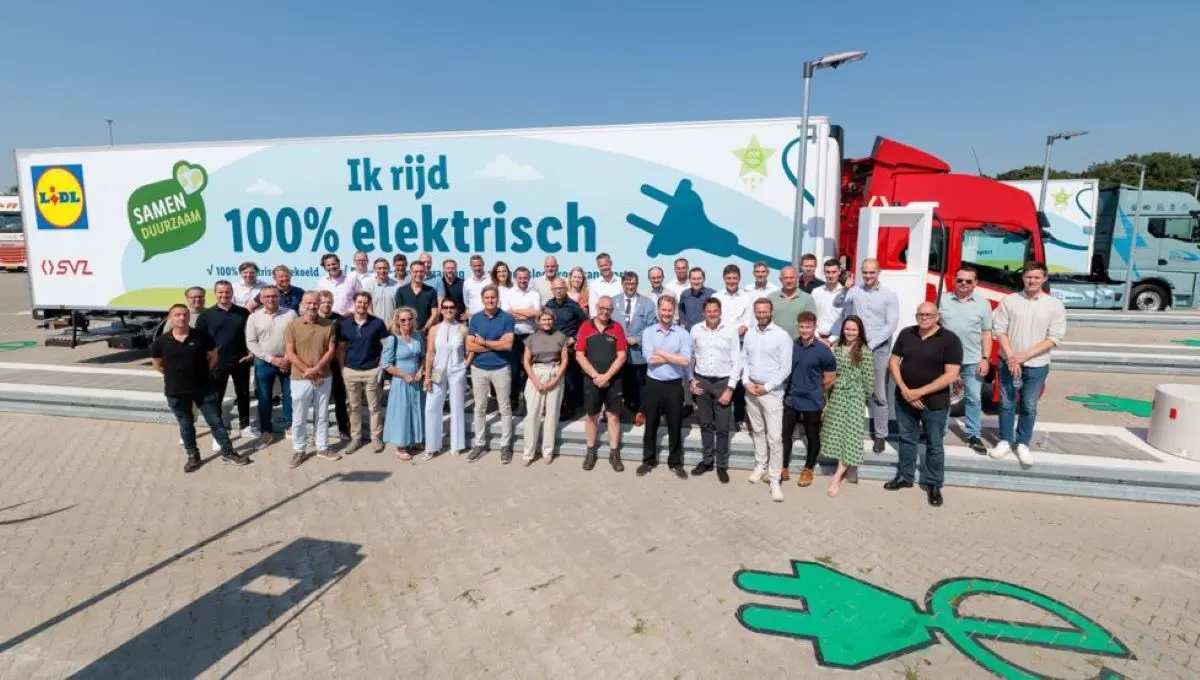Lidl’s Commitment to Sustainability in Logistics
Lidl has recently made headlines by inaugurating a fast charging station specifically designed for electric trucks at its distribution center in the Netherlands. This strategic move highlights the company’s ongoing commitment to sustainability and innovation in the logistics and transportation sectors.
Community Recognition
The local mayor, Vlecken, applauded Lidl for taking on this challenge years ago, stating, “I want to commend Lidl for the challenge they took on years ago and for what they have achieved today. This development enriches Weert, especially because sustainability is a priority for us.” Lidl is positioned as a progressive organization that prioritizes both the well-being of its employees—its most valuable asset—and significant investments in sustainability initiatives.
Shared Charging Infrastructure
An important part of Lidl’s strategy is that the charging station is not exclusively for its fleet; it will also be available to third parties. This collaborative approach demonstrates Lidl’s commitment to tackling sustainability jointly, as the mayor noted, “As a municipality, we can only applaud this.” This openness to sharing resources can foster community partnerships while promoting cleaner transport solutions.
Infrastructure Development
Lidl’s distribution center in Weert has officially activated all charging points, featuring six rapid charging stations capable of delivering 350 kWh. These charging stations play a vital role in supplying energy to the 78 Lidl stores located in Limburg and parts of North Brabant.
Transition to Fossil-Free Operations
The supermarket chain proudly proclaims that all its branches in the Netherlands now operate without fossil fuels. Thanks to proactive preparation and robust collaboration with grid operators and logistics partners, Lidl has successfully implemented this fast charging hub.
Investing in Renewable Energy
The infrastructure not only facilitates charging for Lidl’s trucks but also ensures that the energy supplied comes from 100% ecological sources. A portion of this energy is harnessed from solar panels installed on the distribution center’s roof. This commitment to renewable energy underscores Lidl’s intention to operate sustainably while minimizing its carbon footprint.
Accessible Charging Solutions
Other businesses will also have the opportunity to utilize Lidl’s charging points at favorable rates and during guaranteed time slots. This semi-public approach allows Lidl to further contribute to a sustainable transport network while maximizing efficiency for local logistics.
A Vision for Sustainable Transport
Ruud Metten, the Head of Logistics Purchasing at Lidl Netherlands, articulated the significance of this initiative, stating, “With this fast charging station, Lidl demonstrates that it thinks about opportunities and acts with conviction. This shows that transitioning to completely electric transport is possible and that businesses can indeed offer solutions given the current pressure on the grid.” Emphasizing the collaborative aspect, Metten noted, “The key lies in ‘together.’ Only together can we achieve a transition to sustainable transport and ensure that costs remain low.”
A Decade of Electric Deliveries
Lidl’s journey into electric deliveries began a decade ago in Amsterdam. Currently, four out of six of its distribution centers are fitted with rapid charging stations, and other nearby shops benefit from the energy supplied. The distances between the distribution center and stores average less than 50 kilometers, making this an ideal model for efficient logistics.
Sustainability Meets Efficiency
With electric trucks boasting a range of over 400 kilometers, they present sustainable alternatives tailored to the logistics needs of urban regions focused on reducing emissions. The effective use of rapid charging stations also means reduced downtime, allowing for optimal use of freight transportation resources.
The Growing Importance of Electric Logistics
This initiative from Lidl is a beacon in the logistics industry, reflecting how companies can pivot towards sustainability while enhancing operational efficiency. The impact of such developments on logistics cannot be overstated; they indicate a shifting paradigm in which green logistics are not merely a trend but an essential component of modern supply chain operations.
Personal Experience vs. Reviews
The fascinating transition towards electric logistics cannot be fully understood through reviews and reports alone. Personal experience offers invaluable insights into how these changes will manifest in daily operations. Speaking from this perspective, GetTransport.com is an exemplary platform where users can arrange their cargo transportation at competitive prices, ensuring they make informed decisions without overspending.
The convenience, affordability, and extensive options available through GetTransport.com, as well as its transparency and innovation, align perfectly with the evolving logistics landscape shaped by developments such as Lidl’s charging station.
Conclusion
In conclusion, Lidl’s establishment of a fast charging station for electric trucks in the Netherlands is a key step toward achieving sustainable logistics. This initiative not only reflects a commitment to ecological responsibility but also signals a broader trend within the industry toward greener practices. As logistics continues to evolve, the importance of accessible, efficient transport solutions becomes increasingly evident. Maximizing the benefits of companies like GetTransport.com will be crucial as we navigate future logistics challenges. Start planning your next delivery and secure your cargo with GetTransport.com.

